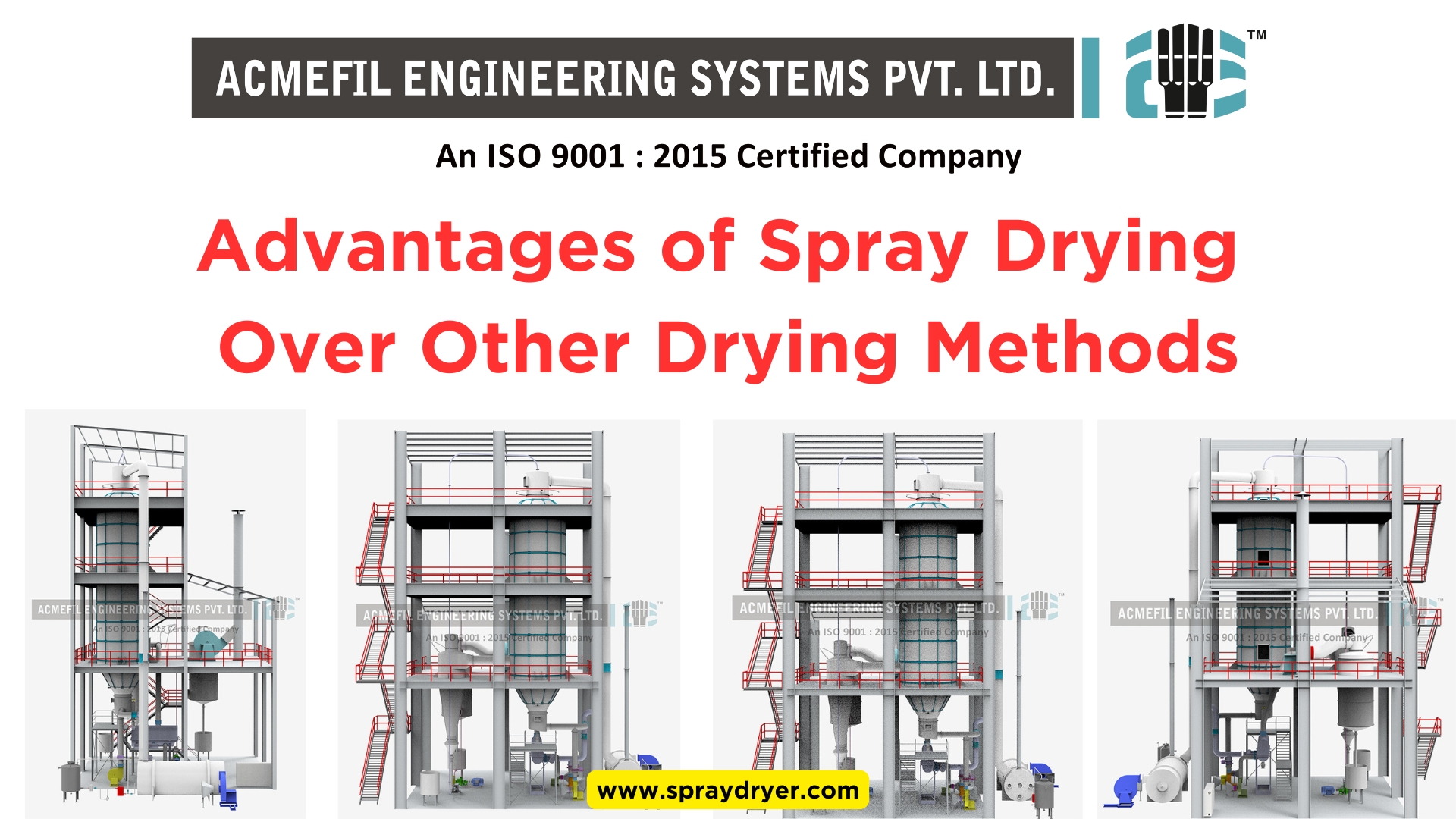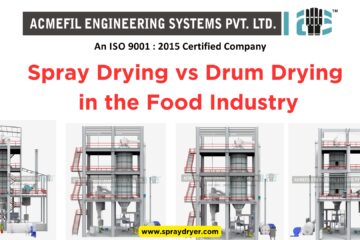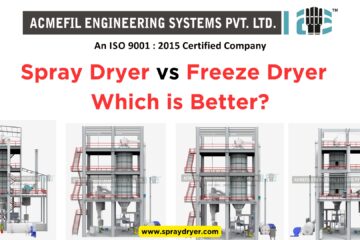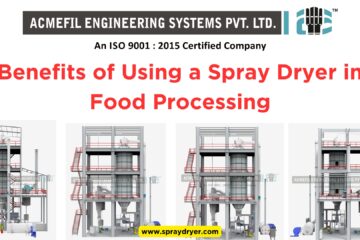Spray drying has become an essential technology across various industries, offering a host of advantages over traditional drying methods. In this article, we will explore the specific benefits of spray drying and why it stands out as a superior choice for manufacturers, particularly in industries like food processing, pharmaceuticals, and chemicals. As a leading spray dryer manufacturer, Acmefil Engineering Systems Pvt. Ltd. aims to provide you with comprehensive insights into the advantages of spray drying technology.
Introduction to Spray Drying
Spray drying is a process where a liquid is atomized into fine droplets and rapidly dried using hot air. The end product is a free-flowing powder with specific characteristics tailored to the needs of different industries. This method is particularly valued for its efficiency, speed, and ability to produce high-quality, uniform products.
Advantages of Spray Drying
- Uniform Particle Size and Consistency
- Spray drying allows for precise control over particle size, resulting in uniform and consistent end products. This uniformity is crucial for industries like pharmaceuticals, where consistent particle size can influence drug solubility and bioavailability.
- Retention of Product Quality
- One of the significant advantages of spray drying is its ability to preserve the quality of sensitive materials. Unlike other drying methods that may expose the product to prolonged heat, spray drying uses a rapid drying process that helps maintain the integrity of heat-sensitive nutrients, flavors, and active ingredients.
- Scalability and Flexibility
- Spray drying is highly scalable, making it suitable for both small-scale laboratory production and large-scale industrial manufacturing. This flexibility allows manufacturers to scale up their processes without compromising on product quality.
- Improved Solubility and Dispersibility
- The spray drying process creates powders that are easily soluble or dispersible in liquids. This characteristic is particularly beneficial in the food and beverage industry, where products like instant coffee, milk powder, and flavors need to dissolve quickly and uniformly.
- High Production Rates
- Spray drying offers high production rates, making it an efficient method for mass production. The ability to produce large quantities of dry powder in a short time frame is advantageous for industries that require fast turnaround times.
- Customization of Product Properties
- Spray drying provides manufacturers with the ability to customize the properties of the final product. By adjusting parameters such as inlet temperature, feed rate, and atomizer speed, manufacturers can produce powders with specific characteristics, such as moisture content, particle size, and bulk density.
- Longer Shelf Life
- Products dried using spray drying typically have a longer shelf life due to the low moisture content achieved through the process. This extended shelf life is particularly important for food products and pharmaceuticals that need to remain stable over time.
- Efficient Energy Use
- Compared to other drying methods, spray drying is more energy-efficient. The rapid drying process reduces energy consumption, making it a cost-effective solution for manufacturers looking to minimize operational costs.
- Reduced Handling and Storage Costs
- Spray-dried products are easier to handle and store compared to those dried using other methods. The powders are free-flowing and can be packed efficiently, reducing the costs associated with packaging, transportation, and storage.
- Versatility Across Industries
- Spray drying is versatile and can be applied across various industries, from food processing to pharmaceuticals and chemicals. Its adaptability to different materials and product requirements makes it a preferred choice for manufacturers looking to optimize their drying processes.
Comparison with Other Drying Methods
- Spray Drying vs. Freeze Drying
- While freeze drying is effective for preserving the nutritional and sensory properties of products, it is significantly more time-consuming and costly compared to spray drying. Freeze drying also results in a more rigid product structure, which may not be desirable for all applications.
- Spray Drying vs. Drum Drying
- Drum drying involves spreading a thin layer of product onto a heated drum, where it dries and is then scraped off. While drum drying is effective for certain products, it often results in uneven drying and may compromise product quality due to prolonged heat exposure. Spray drying, on the other hand, offers more uniform drying and better retention of product quality.
- Spray Drying vs. Fluid Bed Drying
- Fluid bed drying involves passing air through a bed of solid particles, which are then fluidized and dried. While this method is effective for certain granular materials, it is less suitable for liquid products. Spray drying excels in converting liquids into powders, offering greater versatility and efficiency.
Applications of Spray Drying in Various Industries
- Food and Beverage Industry
- In the food and beverage industry, spray drying is used to produce a wide range of products, including instant coffee, milk powder, flavorings, and nutritional supplements. The process ensures that these products retain their flavor, nutritional value, and solubility.
- Pharmaceutical Industry
- Spray drying is widely used in the pharmaceutical industry to produce powders, granules, and capsules. The ability to control particle size and ensure uniformity is critical for creating medications with consistent dosage and efficacy.
- Chemical Industry
- In the chemical industry, spray drying is used to produce catalysts, detergents, and other chemical powders. The process allows for precise control over the chemical composition and physical properties of the final product.
Conclusion
Spray drying offers numerous advantages over other drying methods, making it a preferred choice for manufacturers across various industries. Its ability to produce uniform, high-quality powders with customizable properties, while maintaining efficiency and cost-effectiveness, sets it apart from other drying techniques. As a leading spray dryer manufacturer, Acmefil Engineering Systems Pvt. Ltd. is committed to providing innovative solutions that meet the diverse needs of our clients.
By understanding the benefits of spray drying, you can make informed decisions about optimizing your manufacturing processes, ensuring that you achieve the best possible results for your products.




